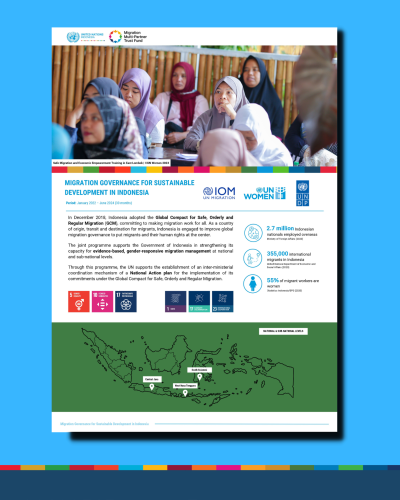Factsheet: Migration Governance for Sustainable Development in Indonesia

As Indonesia steps onto the global stage of migration governance, its commitment to the Global Compact for Safe, Orderly, and Regular Migration (GCM) in December 2018 marks a significant milestone. This dedication reflects Indonesia's multifaceted role as a country of origin, transit, and destination for migrants. Aiming to place migrants and their human rights at the forefront, Indonesia's efforts are geared towards reshaping migration governance on a national and sub-national level. This is not just about numbers; it's about ensuring that the 2.7 million Indonesians employed overseas and the 355,000 international migrants in Indonesia, of whom 55% are women, are supported by robust, fair, and humane migration policies.
The journey towards a more inclusive and rights-focused migration governance is paved with substantial achievements. Capacity building at the national level has seen the convergence of government officials, civil society, and international partners, focusing on essential migration management and the implementation of evidence-based, gender-responsive migration policies. The National Migration Governance Indicator Assessment, a pioneering step in this direction, has highlighted Indonesia's proactive role in regional and international migration discourse. The assessment's findings underscore the commitment to ethical recruitment and the protection of Indonesian migrant workers, in line with the progressive Law on the Protection of Indonesian Migrant Workers.
The localizing of the Global Compact for Migration demonstrates a ground-up approach to governance, engaging local governments, civil society, and migrant associations in a meaningful dialogue. The focus on human rights-based and gender-responsive implementation of the GCM has led to increased awareness and capacity among government officials, civil society, and migrants themselves. Training programs, policy briefs, and innovative financial solutions are just a few examples of the tangible steps taken to empower migrants, especially women, ensuring their journey is not just safe but also dignified and fulfilling.
The Fact Sheets, available in both Bahasa Indonesia and English, provide a comprehensive overview of these concerted efforts and groundbreaking results. They serve as a testament to the transformative power of collaborative governance and the unwavering commitment to making migration work for all, especially the women who form the backbone of this dynamic and evolving landscape. Download the factsheets below.






